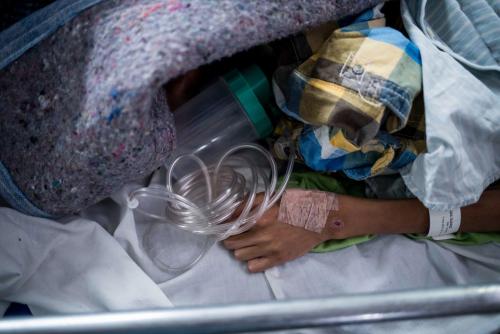UN Security Council: Support Venezuela Emergency Declaration
UN Secretary-General Should Lead Urgent Humanitarian Response
Members of the United Nations Security Council should urge UN Secretary-General Antonio Guterres to formally declare the situation in Venezuela a complex humanitarian emergency that poses a serious risk to the region, Human Rights Watch and researchers from Johns Hopkins Bloomberg School of Public Health said.

A severely malnourished Venezuelan lies in a hospital bed in Cúcuta, Colombia. July 26, 2018.
The 15-nation Security Council will hold a public meeting on April 10, 2019, to discuss Venezuela’s humanitarian crisis, with its worsening shortages of food and medicine. The crisis has become so severe that a full-scale international response is required.
“UN Secretary-General Guterres should ring the alarm bell and demonstrate leadership by ensuring that the UN’s vast resources can be mobilized for the Venezuelan people in a way that is neutral, independent, and impartial,” said Dr. Kathleen Page, a medical doctor and professor at Johns Hopkins School of Medicine. She is one of the lead authors of a new report on Venezuela by Human Rights Watch and the Johns Hopkins Bloomberg School of Public Health.
Page is scheduled to address members of the Security Council on April 10 about the situation. Human Rights Watch and Johns Hopkins researchers found that the combination of severe medicine and food shortages in Venezuela, together with the spread of disease across the country’s borders, amounts to a complex humanitarian emergency requiring a full-scale UN response.
The Venezuelan authorities during the presidency of Nicolás Maduro have proven unable to stem the crisis, and have in fact exacerbated it through their efforts to suppress information about the scale and urgency of the problems, the researchers found.
The food shortages are having a severe impact on the Venezuelan population. In 2018, the UN’s Food and Agriculture Organization (FAO) indicated that between 2015 and 2017, nearly 12 percent of Venezuelans – 3.7 million people – were undernourished, up from fewer than 5 percent between 2008 and 2013. Hospitals have registered increased numbers of malnourished children, as well as deaths of children with acute malnutrition.
The crisis has spread beyond Venezuela’s borders. A massive exodus of Venezuelans – more than 3.4 million in recent years – is straining resources in receiving countries. Data gathered in Colombia and Brazil shows a sharp rise in the number of Venezuelans seeking medical treatment abroad, and doctors reported that Venezuelans generally arrived after receiving limited or no treatment at home.
Venezuelan authorities under Maduro have concealed the crisis by ending the once-regular publication of official health information. They have harassed and retaliated against those who collect data or speak out about food and medicine shortages. These actions, together with the government’s failure to acknowledge the full scope of the problem, have made a comprehensive diagnosis of the crisis impossible. Such a diagnosis is critical to creating an effective humanitarian response.
“As bad as the humanitarian situation is in Venezuela, it has the potential to get much worse,” said Louis Charbonneau, UN director at Human Rights Watch. “The secretary-general and his team can prevent that from happening by mobilizing the UN system and pressing Venezuelan authorities to allow it to help save Venezuelan lives, and Security Council members should publicly urge him to do so.”
Source:Human Rights Watch
- 355 reads
Human Rights
Ringing FOWPAL’s Peace Bell for the World:Nobel Peace Prize Laureates’ Visions and Actions

Protecting the World’s Cultural Diversity for a Sustainable Future

The Peace Bell Resonates at the 27th Eurasian Economic Summit

Declaration of World Day of the Power of Hope Endorsed by People in 158 Nations

Puppet Show I International Friendship Day 2020

